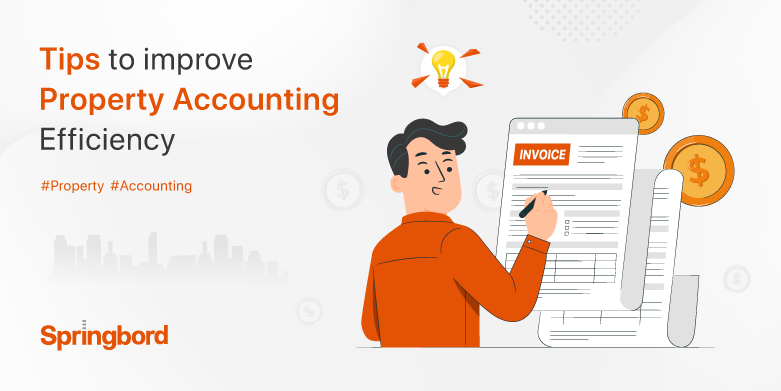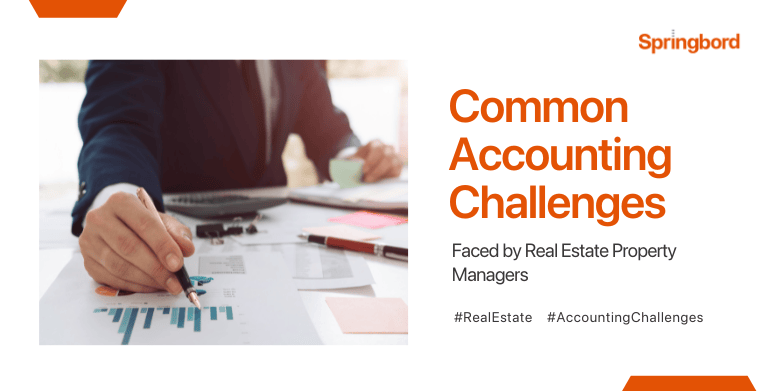 Read time 6 min
Read time 6 minCash flow management is a critical aspect of commercial real estate investments, directly impacting investment performance, financing, property valuation, and appreciation. In the realm of commercial real estate, Springbord’s expertise in data management and analytics can significantly enhance these aspects.
By leveraging advanced data analytics, Springbord can provide deeper insights into cash flow trends and asset performance, aiding in informed decision-making and strategic planning.
Understanding Cash Flow in Commercial Real Estate
In the context of commercial real estate services, cash flow is the net amount of cash being transferred into and out of a property. It’s essential for assessing a property’s financial health. Key calculations in cash flow analysis include Gross Operating Income (GOI), Net Operating Income (NOI), and Cash-on-Cash Return. GOI encompasses total income before expenses, while NOI reflects income after operating expenses. Cash-on-cash return measures the return on the actual cash invested, offering a realistic view of investment performance.
The commercial real estate industry often experiences fluctuations in cash flow due to various factors, such as changing market conditions, tenant dynamics, and operating costs. For instance, expenses like property taxes, insurance premiums, utilities, and maintenance can significantly impact cash flow. Additionally, factors like vacancy rates and tenant turnover need to be considered, as they directly affect rental income and overall financial performance.
Springbord’s proficiency in handling complex data can illuminate these technical aspects. By analyzing market trends and property-specific data, Springbord can help investors navigate the complexities of cash flow management in commercial real estate, providing valuable insights for optimizing asset performance.
Challenges in Cash Flow Management
Managing cash flow in commercial real estate involves navigating several challenges. Market conditions can fluctuate, affecting property values and rental rates. Tenant inconsistencies, such as delayed payments or high turnover rates, can disrupt stable cash flow. Maintenance and operational costs also need to be balanced against income to maintain profitability.
Seasonal fluctuations present another challenge. For instance, certain times of the year might see higher maintenance costs or variable tenant occupancy rates, impacting cash flow predictability. Effective cash flow management strategies, such as automated rent collection, expense tracking, and budgeting tools, can help in preparing for these fluctuations, maintaining financial stability throughout the year.
Springbord’s experience in the industry positions it well to help business owners tackle these challenges. By leveraging its expertise in data analytics, Springbord can provide actionable insights for optimizing cash flow. This might include strategies for boosting income, like exploring ancillary revenue streams or reducing expenses through efficient property management and cost control measures.
Strategies for Effective Cash Flow Management
Effective cash flow management in commercial real estate involves several key strategies:
- Optimizing Rental Revenue: This includes negotiating favorable leases to attract quality tenants, thus ensuring stable rental income. Real estate asset managers play a critical role in this process, leveraging their understanding of the rental market to structure lease terms at market benchmark levels and mitigate tenant rollover risks.
- Minimizing Operating Expenses: Regularly shopping for service providers ensures competitive pricing. Asset managers can also structure leases to shift maintenance and capital expense responsibilities to tenants, which helps in reducing the owner’s operating costs. Appealing real estate taxes can also lead to significant savings.
- Monitoring Capital Markets: Understanding capital market trends is crucial. This includes the optimal construction of the capital stack for real estate acquisitions and refinancing existing debt to improve cash flow.
- Diversification: Consider diversifying your investment portfolio by mixing property types, locations, and industries. This helps mitigate risk and capture opportunities in different sectors.
- Technology and Infrastructure Investments: Investing in technology-driven solutions like smart sensors, energy management systems, and predictive maintenance software can reduce operating expenses and enhance property value.
Springbord’s expertise in data analytics and predictive modeling can significantly aid in these strategies. By analyzing market trends and property-specific data, Springbord can provide insights for optimizing rental income, reducing operating expenses, and making informed decisions about portfolio diversification and technology investments.
Leveraging Technology and Data Analytics
Technology and data analytics play a pivotal role in forecasting and managing cash flow in commercial real estate:
- Forecasting and Managing Cash Flow: Technology and data analytics, areas where Springbord excels, are critical in forecasting and managing cash flow in commercial real estate. Advanced analytics can provide insights into market trends, tenant behaviors, and operational efficiencies.
- Building Information Modeling (BIM): BIM technology enables detailed digital representations of buildings, improving design accuracy and enabling real-time collaboration among stakeholders. Integrating IoT and AI technologies with BIM can enhance predictive maintenance and energy optimization.
- Modular Construction: Utilizing modular construction methods can reduce construction time and labor costs. Advanced design software and manufacturing techniques used in modular construction can improve the efficiency and sustainability of building projects.
- Effective Tenant Screening and Lease Management: Smart tenant selection is foundational for reliable cash flow. Screening for tenants with strong financials and a good reputation ensures consistent rent payments. Moreover, structuring leases with favorable terms, such as long-term commitments and built-in rent escalations, can provide stability and keep pace with market trends.
- Regular Property Maintenance and Upgrades: A proactive approach to property maintenance and timely upgrades can prevent costly repairs and enhance property value. Regular maintenance ensures the property remains attractive and functional for tenants, while strategic renovations or upgrades can increase rental rates and overall property appeal.
- Efficient Expense Management: Reducing operating expenses without compromising the quality of the property or services is crucial. This can include energy-efficient upgrades, regular maintenance schedules, and negotiating better terms with service providers. Efficiently managing expenses improves the property’s net operating income, positively impacting cash flow.
- Diversification and Portfolio Management: Diversifying the investment portfolio by property type, location, and tenant mix can mitigate risks associated with market fluctuations and ensure steady cash flow from different sources. Regularly evaluating the portfolio and making strategic adjustments based on market conditions can maximize returns.
- Market Research and Competitive Analysis: Understanding local market trends and competitive landscapes is essential. This involves staying updated with rental rates, tenant demands, and property values in the area. Utilizing market research to inform decisions about property acquisitions, lease terms, and investment strategies can significantly impact cash flow optimization.
Springbord’s Role in Enhancing Cash Flow Management
Springbord offers a comprehensive suite of services tailored to enhance cash flow management for real estate firms. Their approach to managing account payables is strategic and customized, ensuring timely payments that align with a firm’s cash flow requirements.
This method strengthens supplier relationships and ensures financial stability. Springbord uses advanced analytics and automated systems for precise monitoring and managing of receivables and payables, thus addressing the complex challenges faced in real estate cash flow management, such as delays in receivables, fluctuations in property taxes, unexpected maintenance costs, and the cyclical nature of property markets.
Key services provided by Springbord include:
- Income and Expenditure Tracking: This involves capturing rental income and efficiently tracking maintenance, repairs, taxes, insurance, utilities, and management fees.
- Bank Reconciliation: Aligning bank statements with financial records to identify discrepancies and enhance accuracy in financial tracking.
- Accounts Payable and Receivable: Effective handling of invoices and payments, ensuring on-time vendor payments, and tracking tenant payments and late fees.
- General Ledger Maintenance: Keeping records of all property-related financial transactions and categorizing them for precise financial reporting.
- Financial Reporting: Preparation of regular financial statements and tailored financial summaries.
- Budgeting and Forecasting: Collaborating with property owners to develop annual property budgets and assist in financial forecasting and planning.
Springbord’s proficiency in data management solutions also extends to lease abstraction and data validation, which is crucial for real estate firms.
Their expertise in these areas has been well-received by clients, particularly for their responsiveness, professionalism, and ability to deliver quality services on or ahead of schedule.
Conclusion
Effective cash flow management is fundamental to the financial stability and growth of real estate firms. Springbord, with our range of specialized services in finance and data management, provides real estate businesses with the tools and expertise needed for efficient cash flow management. Our strategic approach to handling payables and receivables, coupled with advanced analytics and automated systems, empowers real estate companies with improved financial stability, reduced operational costs, and enhanced decision-making capabilities.
For real estate businesses looking to optimize their cash flow management and achieve long-term financial success, considering Springbord’s services would be a strategic step. Our proven track record of improving operational efficiencies and financial forecasting makes us a valuable partner in navigating the complexities of the real estate market.
For more information and to explore how Springbord can assist in your real estate investment endeavors, reach out us for effective cash flow management in the dynamic world of real estate.








